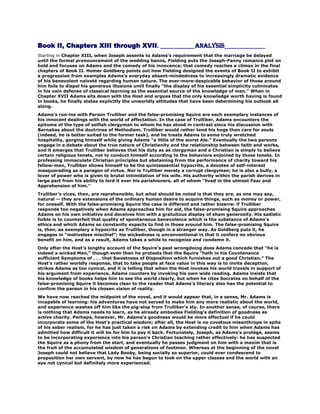
Book ii, chapters xiii through xvii. joseph andrews
- 1. Book II, Chapters XIII through XVII. ___________ANALYSIS_____________ Starting in Chapter XIII, when Joseph assents to Adams’s requirement that the marriage be delayed until the formal pronouncement of the wedding banns, Fielding puts the Joseph-Fanny romance plot on hold and focuses on Adams and the comedy of his innocence; that comedy reaches a climax in the final chapters of Book II. Homer Goldberg points out how Fielding designed the events of Book II to exhibit a progression from examples Adams’s everyday absent-mindedness to increasingly dramatic evidence of his benevolent naïveté regarding human nature. The ever-more-despicable behavior of those around him fails to dispel his generous illusions until finally “the display of his essential simplicity culminates in his vain defense of classical learning as the essential source of the knowledge of men.” When in Chapter XVII Adams sits down with the Host and argues that the only knowledge worth having is found in books, he finally states explicitly the unworldly attitudes that have been determining his outlook all along. Adams’s run-ins with Parson Trulliber and the false-promising Squire are each exemplary instances of his innocent dealings with the world of affectation. In the case of Trulliber, Adams encounters the epitome of the type of selfish clergyman to whom he has stood in contrast since his discussion with Barnabas about the doctrines of Methodism. Trulliber would rather tend his hogs than care for souls (indeed, he is better suited to the former task), and he treats Adams to some truly wretched hospitality, gorging himself while giving Adams “a little of the worst Ale.” Eventually the two parsons engage in a debate about the true nature of Christianity and the relationship between faith and works, and it emerges that Trulliber believes that his duty as as clergyman and a Christian is simply to believe certain religious tenets, not to conduct himself according to the behaviors enjoined by those tenets. In professing immaculate Christian principles but abstaining from the performance of charity toward his fellow-man, Trulliber shows himself to be the quintessential hypocrite, a devotee of self-interest masquerading as a paragon of virtue. Nor is Trulliber merely a corrupt clergyman; he is also a bully, a lover of power who is given to brutal intimidation of his wife. His authority within the parish derives in large part from his ability to lord it over his parishioners, all of whom “lived in the utmost Fear and Apprehension of him.” Trulliber’s vices, then, are reprehensible, but what should be noted is that they are, as one may say, natural -- they are extensions of the ordinary human desire to acquire things, such as money or power, for oneself. With the false-promising Squire the case is different and rather bizarre: if Trulliber responds too negatively when Adams approaches him for aid, the false-promising Squire approaches Adams on his own initiative and deceives him with a gratuitous display of sham generosity. His sadistic foible is to counterfeit that quality of spontaneous benevolence which is the substance of Adams’s ethics and which Adams so constantly expects to find in those around him. The false-promising Squire is, then, as exemplary a hypocrite as Trulliber, though in a stranger way. As Goldberg puts it, he engages in “motiveless mischief”; his wickedness is unconventional in that it confers no obvious benefit on him, and as a result, Adams takes a while to recognize and condemn it. Only after the Host’s lengthy account of the Squire’s past wrongdoing does Adams concede that “he is indeed a wicked Man,” though even then he protests that the Squire “hath in his Countenance sufficient Symptoms of . . . that Sweetness of Disposition which furnishes out a good Christian.” The Host’s rather worldly response, that to take people at face value in this way is to invite deception, strikes Adams as too cynical, and it is telling that when the Host invokes his world travels in support of his argument from experience, Adams counters by invoking his own wide reading. Adams insists that his knowledge of books helps him to see the world clearly, but when he cites Socrates on behalf of the false-promising Squire it becomes clear to the reader that Adams’s literacy also has the potential to confirm the parson in his chosen vision of reality. We have now reached the midpoint of the novel, and it would appear that, in a sense, Mr. Adams is incapable of learning: his adventures have not served to make him any more realistic about the world, and experience washes off him like the pig-slop from Trulliber’s sty. In another sense, of course, there is nothing that Adams needs to learn, as he already embodies Fielding’s definition of goodness as active charity. Perhaps, however, Mr. Adams’s goodness would be more effectual if he could incorporate some of the Host’s practical wisdom; after all, the Host is no covetous misanthrope in spite of his sober realism, for he has just taken a risk on Adams by extending credit to him when Adams has admitted how difficult it will be for him to pay it back. Fortunately, Joseph, as Adams’s protégé, seems to be incorporating experience into his parson’s Christian teaching rather effectively: he has suspected the Squire as a phony from the start, and eventually he passes judgment on him with a maxim that is the fruit of the accumulated wisdom of generations of footmen. Whereas at the beginning of the novel Joseph could not believe that Lady Booby, being socially so superior, could ever condescend to proposition her own servant, by now he has begun to look on the upper classes and the world with an eye not cynical but definitely more experienced.
